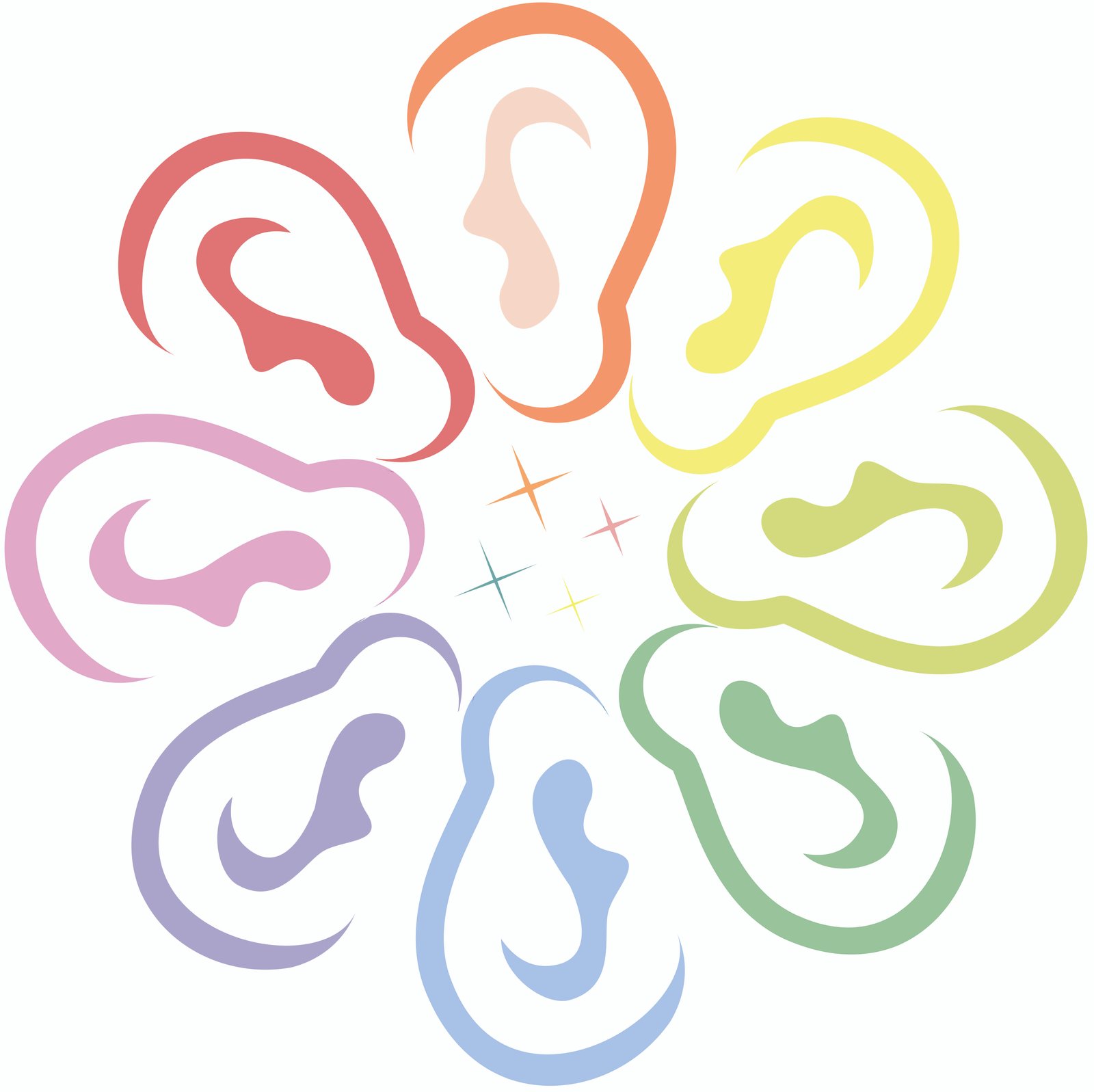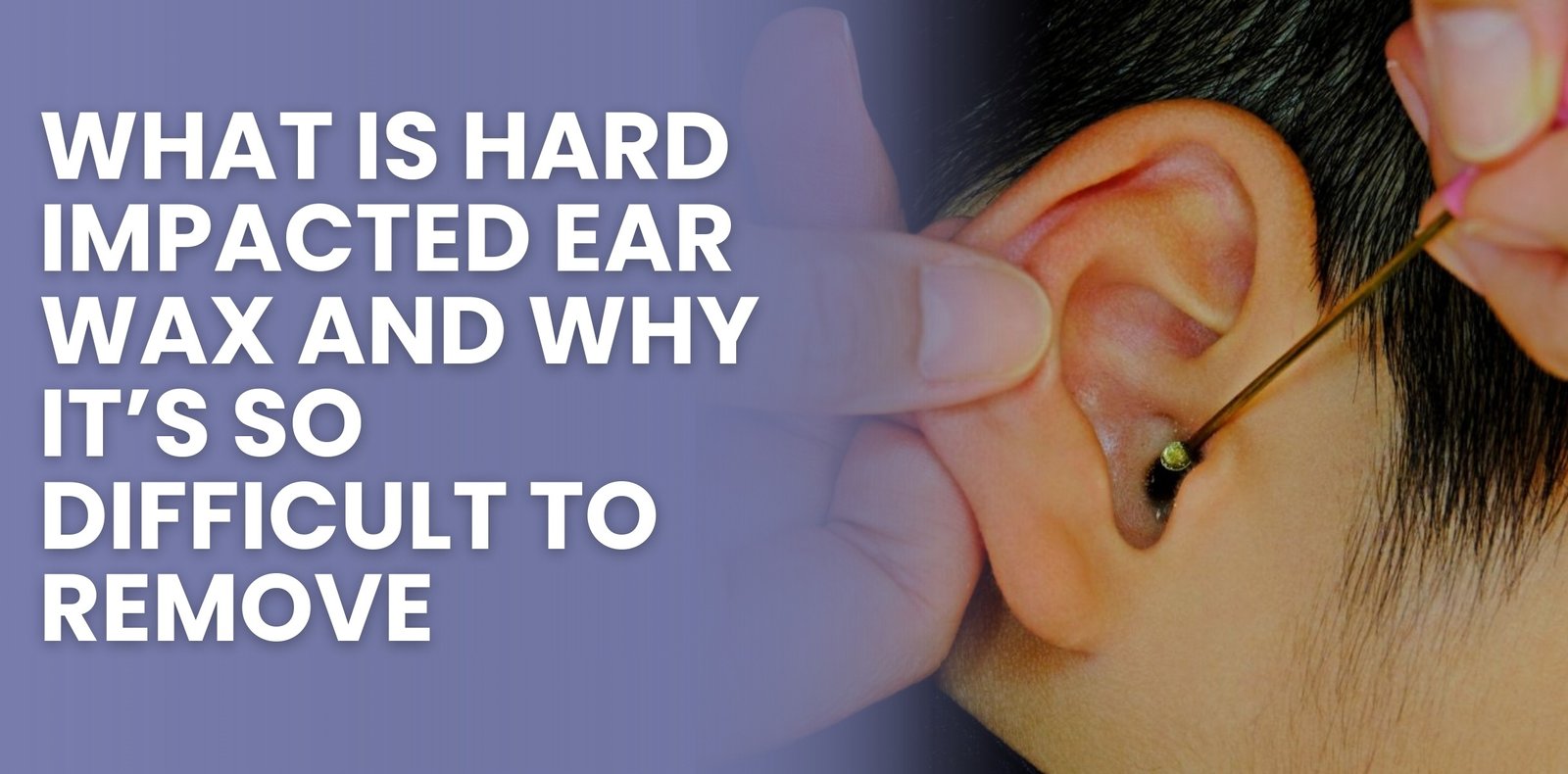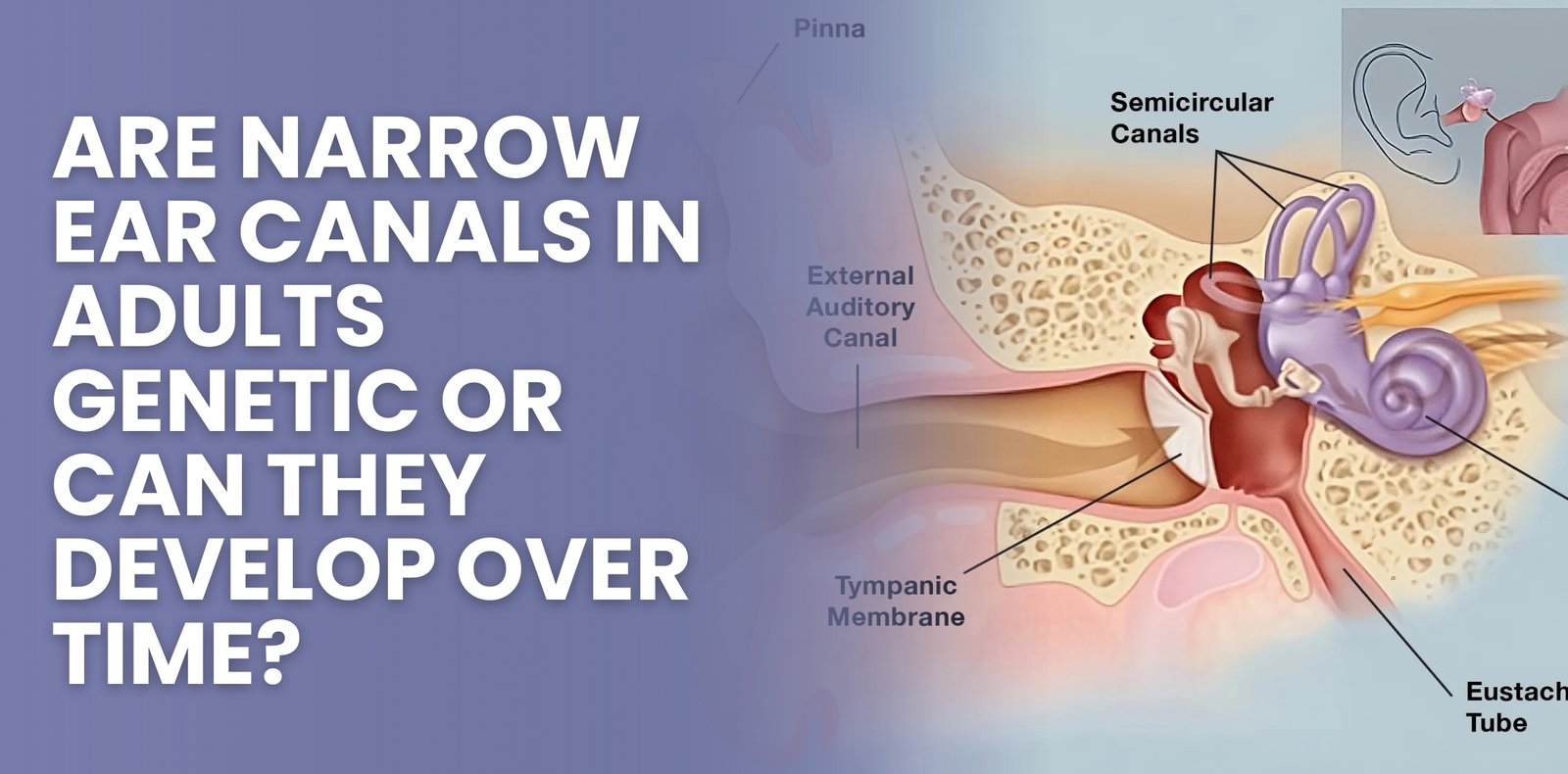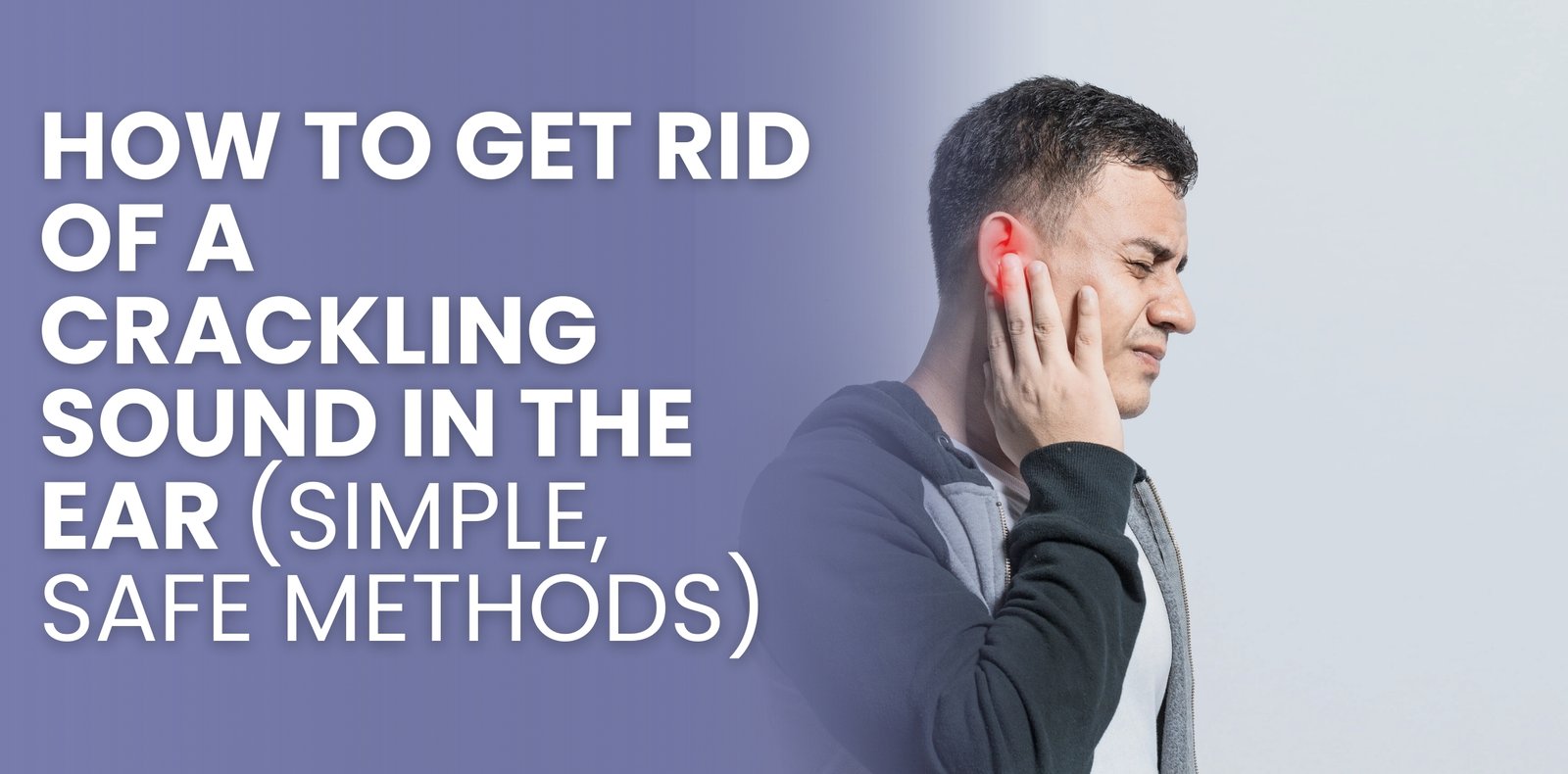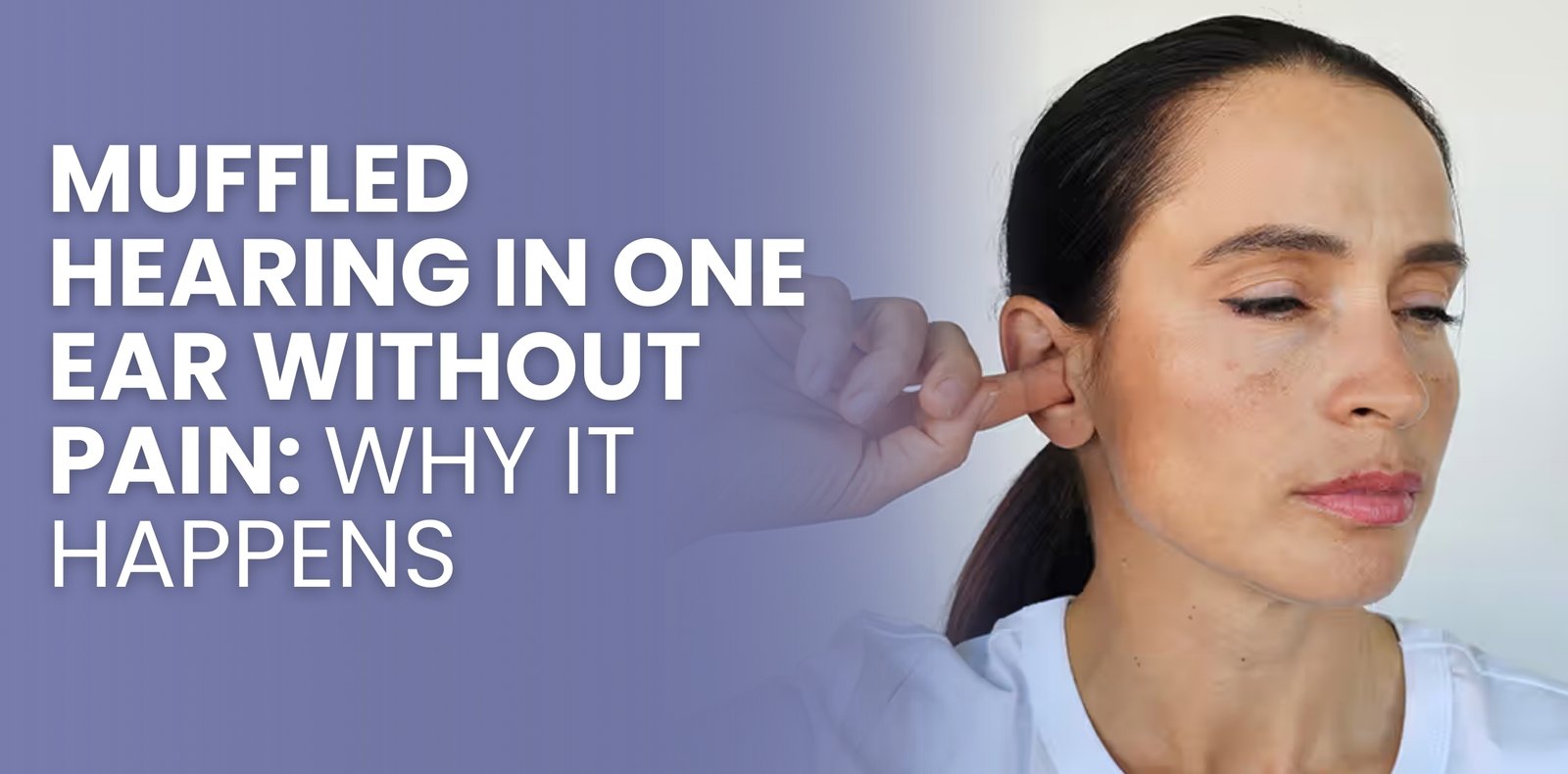Imagine sitting in a quiet room and hearing a constant ring, buzz, or hum.
No one else hears it, but it follows you everywhere.
That is tinnitus.
For some people it is faint, like distant static.
For others, it feels intrusive, making sleep or focus almost impossible.
Tinnitus is not a disease.
It is a symptom of an underlying issue, often harmless, sometimes a warning.
This guide explains what tinnitus is, the different forms it takes, the causes, new treatments, exercises, and when it signals something more serious.
What is Tinnitus?
Tinnitus is the perception of sound without any external source. The sound can vary:
- Ringing
- Buzzing
- Clicking
- Roaring
- Hissing
It can affect one or both ears. Some people hear it constantly, others only occasionally. It might get louder at night when background sounds are minimal.
What is Pulsatile Tinnitus?
Not all tinnitus is the same. Pulsatile tinnitus is unique because it matches your heartbeat.
People often describe it as a rhythmic whooshing or thumping in the ear.
This form is less common but important. It can signal blood flow changes around the ear or head.
Causes include high blood pressure, vessel narrowing, anaemia, or middle ear issues.
Because pulsatile tinnitus is often linked to circulation, it should always be checked by a clinician.
Understanding the Causes of Tinnitus
Tinnitus has multiple triggers. Some are simple and temporary, while others are longer-term.
| Common cause | How it leads to tinnitus |
| Ear wax build-up | Creates pressure and muffles sound. The brain fills the gap with phantom noise. |
| Loud noise exposure | Concerts, headphones, or factory work damage inner ear cells. |
| Ageing | Hearing nerves lose efficiency, leaving sound “gaps.” |
| Medications | Certain antibiotics, aspirin, and chemotherapy drugs can cause ringing. |
| Stress and fatigue | Lower resilience of the brain’s sound filters. |
| Health issues | Diabetes, high blood pressure, jaw or neck problems. |
Often, tinnitus appears when hearing loss is present. The brain “invents” sound to fill missing frequencies. That’s why hearing aids are frequently part of tinnitus management.
Also Read>>>>
8 Surprising Benefits of Professional Ear Cleaning
What Percentage of Tinnitus is Permanent?
Most people will experience tinnitus at some point, after a loud gig, a heavy cold, or a stressful period. For many, it fades within days or weeks.
But research shows about 10–15% of adults live with ongoing tinnitus. Within that group, only a smaller percentage experience severe distress.
Permanent tinnitus usually results from lasting inner ear or nerve damage. Even then, it can often be managed successfully.
Tinnitus Treatment Options: From Proven Therapies to New Breakthroughs
While there is currently no single cure for tinnitus, significant scientific progress is being made to effectively manage and reduce its impact.
The latest approaches focus on retraining the brain and significantly improving your quality of life.
Tinnitus management is multifaceted and often involves a combination of these proven and emerging therapies.
The latest treatment for tinnitus focuses on retraining the brain and improving quality of life.
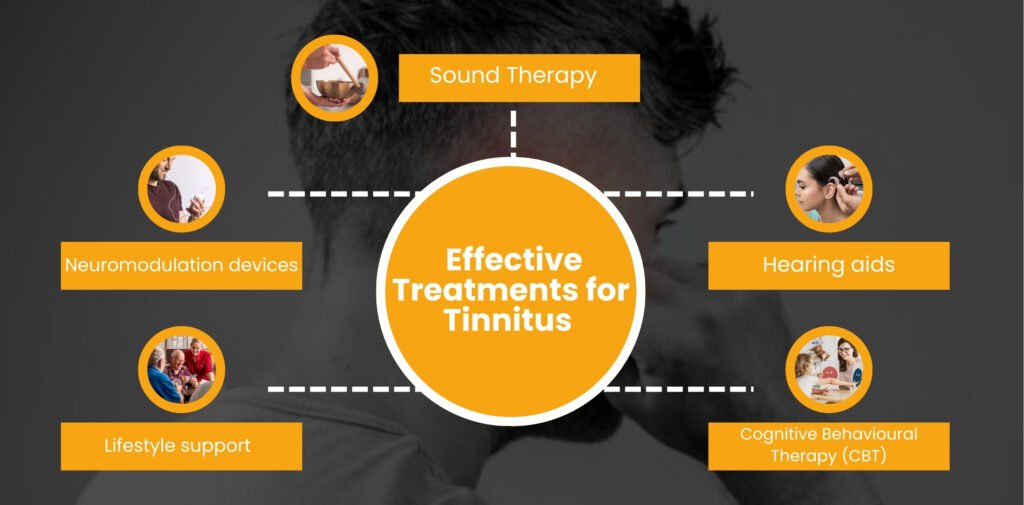
- Sound therapy –
Sound therapy works by using external sounds to change your perception of tinnitus.
This can be as simple as using background sounds (like white noise or nature sounds) to make the ringing less noticeable, or it can involve more sophisticated devices.
A tinnitus masker is a small electronic device worn in the ear, similar to a hearing aid, that emits a sound to cover up the perceived tinnitus.
Advanced therapies, like tinnitus retraining therapy (TRT), use sound to teach your brain to ignore the constant noise. - Hearing aids –
For many, tinnitus is linked to hearing loss.
In these cases, wearing a hearing aid can be a highly effective treatment.
By amplifying external sounds, hearing aids can naturally reduce the prominence of tinnitus.
When your brain is receiving more sound from your environment, it pays less attention to the internal noise, thereby reducing its perceived volume and annoyance. - Cognitive Behavioural Therapy (CBT) –
Tinnitus can cause significant stress, anxiety, and frustration.
Cognitive Behavioural Therapy (CBT) is not a cure for the sound itself, but it’s an incredibly powerful tool for changing your emotional response to it.
A therapist helps you develop coping strategies and a different mindset, helping you respond to the tinnitus with less fear and distress.
This effectively reduces the burden of the condition, allowing you to focus less on the sound and more on your daily life. - Neuromodulation devices –
As a new and exciting frontier in treatment, neuromodulation devices are designed to directly address the neurological root of tinnitus.
These innovative devices deliver a mild electrical stimulation in combination with sound to specific areas of the brain.
The goal is to “reset” the neural patterns responsible for the ringing sound, offering a targeted and precise approach to treatment. - Lifestyle support –
Managing tinnitus also involves adopting supportive lifestyle habits.
Getting better sleep, practicing stress-reduction techniques like mindfulness or meditation, and following a consistent ear care routine are all vital steps.
For many, including those with earwax buildup-related tinnitus, seeking professional ear care is a crucial part of a comprehensive strategy.
At Dewaxify, we always begin with a free hearing test online. If wax is the culprit, we may recommend microsuction ear wax removal first.
If hearing loss is present, aids with tinnitus programmes often bring noticeable relief.
Immediate Relief from Tinnitus: 3 Things You Can Try Now
There is no universal trick. But some quick coping tools can calm symptoms:
- Background noise –
One of the most effective and immediate ways to get relief is to introduce a new sound to your environment.
Your brain naturally focuses on the most prominent noise.
By adding a soft, constant sound, you can make the tinnitus less noticeable.
Try a fan or an air conditioner. The low hum can be surprisingly effective.
Download a white noise app on your phone. Many apps offer a variety of sounds, like rain, ocean waves, or static, that you can use anywhere.
Play soft, instrumental music. A gentle soundtrack can give your brain something else to focus on. - Jaw and neck relaxation –
Many people don’t realize that muscle tension in the jaw and neck can often worsen tinnitus symptoms.
Practicing simple relaxation exercises can help.
Gently massage your jawline and the sides of your neck to release tension.
Practice slow, gentle stretches for your neck. Tilt your head from side to side and forward and back to relieve any tightness. - Breathing exercises –
Tinnitus symptoms are often amplified by stress and anxiety.
When you feel the ringing becoming overwhelming, a simple breathing exercise can help calm your body and mind.
Breathe in slowly through your nose for four seconds.
Hold your breath for seven seconds.
Exhale slowly through your mouth for eight seconds.
Repeat this a few times until you feel your body begin to relax.
These are excellent first steps, but it’s important to remember that these are temporary measures, not cures.
For long-term relief and to find a lasting solution, these quick fixes should be paired with a long-term management strategy, such as professional care.

Exercises to Reduce Tinnitus Symptoms and Improve Well-Being
While exercise doesn’t cure tinnitus, it’s a powerful tool for managing symptoms and significantly improving your quality of life.
Regular physical activity improves circulation, reduces stress, and supports overall ear health, which can all contribute to a reduction in tinnitus perception.
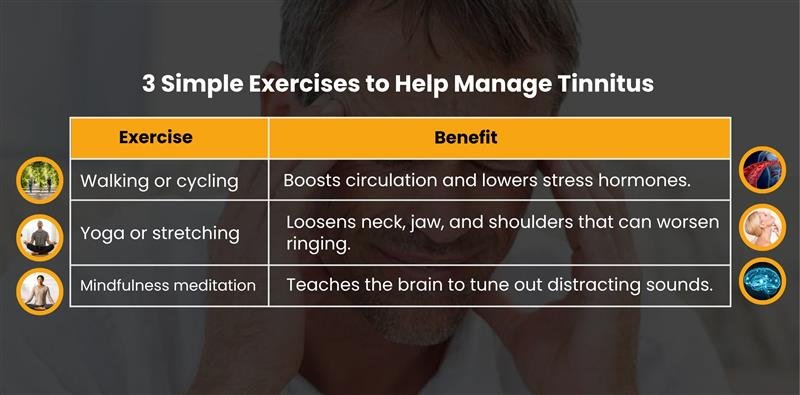
Important Note: Consistency matters more than intensity. Even short, regular sessions of these exercises can make a big difference. Always remember to protect your ears by avoiding loud music, especially in a gym environment.
When Tinnitus is a Sign of a More Serious Condition
While tinnitus is often benign, it’s important to be aware that it can, in some cases, be a symptom of an underlying medical condition.
Knowing the warning signs can help you determine when to seek professional medical advice.
See a doctor if you notice:
- Sudden tinnitus in one ear
- Pulsatile tinnitus in time with your heartbeat.
- Tinnitus with dizziness, balance problems, or hearing loss.
- Tinnitus after a head injury.
- Persistent distress that affects sleep or work.
These symptoms may signal infections, vascular issues, or neurological problems. Early checks are safer than waiting.
Maria’s Story: From Constant Ringing to Calm
Maria, a 52-year-old teacher, lived with buzzing in both ears for six months. She tried over-the-counter drops, but nothing worked. She searched “ear wax removal Ilford” and booked Dewaxify.
During her visit, our team found compacted wax. A quick microsuction ear wax removal cleared it. After a follow-up free online hearing test, her hearing was sharp, and her tinnitus dropped to a faint background.
Maria now uses olive oil ear drops once a month to keep her ears clear and books regular checks.
Her story shows that tinnitus can often improve with the right care.
Dewaxify’s Professional Approach to Ear Health
At Dewaxify, we believe that proper ear care is the foundation of good hearing and overall well-being.
As a leading provider of ear wax removal in Ilford, we are committed to helping our local community hear clearly and live better.
Our approach is rooted in providing professional, safe, and effective solutions.
While many causes of tinnitus require long-term medical management, a significant number of cases are related to one of the simplest causes: excess earwax buildup.
Our specialized ear care services focus on professional, safe ear wax removal.
Unlike traditional methods that can be uncomfortable or even dangerous, we use the latest techniques, such as microsuction, to gently and thoroughly clear the ear canal.
This procedure is performed by trained specialists, ensuring a comfortable and reliable experience.
By addressing earwax buildup, we can often provide immediate relief from tinnitus symptoms and prevent future issues.
Our professional approach to ear care is a vital part of a holistic wellness routine, helping to ensure your ears are healthy and your hearing is clear.
We’re committed to not only solving the problem at hand but also to educating our clients on best practices for ongoing ear health.
Final Word
Tinnitus does not always mean something is wrong, but it should never be ignored. Whether your ringing is temporary, pulsatile, or ongoing, help is available.
With safe ear care, new therapies, and expert support, you can reduce tinnitus and reclaim quiet moments again.
Book your consultation at Dewaxify London today and start your journey toward calmer ears and clearer hearing.
Is tinnitus permanent?
Not always. Temporary tinnitus is common. Chronic tinnitus affects around 10–15% of adults.
Can hearing aids help tinnitus?
Yes. By amplifying background sounds, hearing aids reduce focus on tinnitus.
What is pulsatile tinnitus?
A form of tinnitus that pulses with your heartbeat. Always see a doctor.
How long does treatment take to work?
Relief may come in weeks to months, depending on the method.
What’s the best exercise for tinnitus?
Gentle aerobic activity, yoga, and mindfulness are the most helpful.
